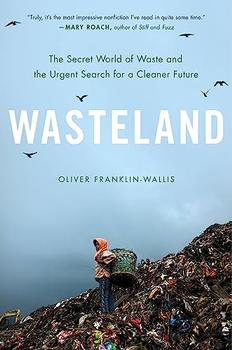Summary | Excerpt | Reviews | Beyond the Book | Readalikes | Genres & Themes | Author Bio
The Secret World of Waste and the Urgent Search for a Cleaner Future

 Book Reviewed by:
Book Reviewed by:
Elisabeth Herschbach
Buy This Book
Excerpt
Wasteland
The stories began in early 2018. Always different, always the same. There would be a village, a town. Then, suddenly, plastic factories would arrive. Small operations: shredders, extruders. Nurdle factories. Men would appear, advertising work, profit to be made. Then: smoke. The smell of burning polymers in the night. Locals reporting headaches, breathing problems. In one case, children started to develop skin rashes. Dumps accruing in the fields, in waterways, in ditches, the labels invariably in foreign tongues.
Perak, Malaysia: Heinz beans wrappers, Flora margarine tub. Yeo Valley yogurt pot. Listerine mouthwash. Recycling bags from four London councils. Cat food pouches from Spain. Wafer packets from Germany. Factory offcuts from Australia. US postal service boxes. Fiji water bottles, Made in USA.
East Java, Indonesia: Gatorade bottle. Arizona Sweet Tea. Capri Sun packets from the UK. Dish soap from Finland. Whiskas cat food, Hershey's cookies. Even the occasional banknote, slipped accidentally into the trash: US dollars, Canadian dollars, Russian rubles, Saudi riyals, Korean won.
Adana, Turkey: Andrex toilet roll wrappers. KP salted peanuts packet, Asda cashews. Marks & Spencer bacon. McCain's home fries. Cherry Pepsi Max. A Tesco plastic bag, emblazoned with flowers, and the phrase "REUSE AT HOME, RECYCLE. Every little helps."
What do you do if you're the waste industry, collecting thousands of tons of mixed, contaminated, or multilayered plastics that—largely unknown to the general public—are impossible or unprofitable to recycle? You make it somebody else's problem.
Exporting waste is nothing new. Wastepaper, rags, and scrap metals have been traded for centuries. In Victorian London, for example, one "volcano-like" dust heap that towered over King's Cross in 1826 was shipped to Russia to be used in the rebuilding of Moscow after the devastating fire of 1812. Waste was and is material—like any commodity, it moves where the market is. But the global waste trade in its current form did not truly take off until the second half of the twentieth century, as consumers in the Global North began gorging on cheap goods made largely in Asia.
By the 1990s, the act of making things had largely been exported—that is to say, globalized, chasing cheap labor. But, while thousands of shipping containers arrived in the West every day from Chinese ports packed to the brim with our every need (and plenty of things we didn't know we needed yet), there was little to send back. China buys far less from the West than it sells (the so-called "trade deficit"). Rather than sail back empty, canny entrepreneurs began to fill the containers with our most abundant product: waste.
At first, these exports were predominantly scrap metal, which was desperately needed by the exploding Chinese manufacturing industry. As the journalist Adam Minter writes in his scrap travelogue Junkyard Planet, although the US in particular was still producing prodigious quantities of excess metal, many American smelters were closing due to tightening environmental standards, a problem they didn't face in China.
Chinese waste imports continued to grow, and when the country was finally admitted to the World Trade Organization in 2000, a metaphorical dam broke. The flow became a torrent. Between 2003 and 2011, China's scrap imports increased sevenfold. The country was soon the leading destination worldwide for waste steel, copper, aluminum, paper—and eventually, plastics. By 2016, the United States alone was sending 1,500 shipping containers full of waste to China every day.
It's hard to fully measure the extent to which China's economic miracle was enabled by Western waste. For China, the benefits of importing our garbage were clear: its industry needed raw materials, and there was not enough domestic supply to fill the world's ravenous appetite for Made in China goods. It was also, in some ways, more sustainable.
Excerpted from Wasteland: The Secret World of Waste and the Urgent Search for a Cleaner Future by Oliver Franklin-Wallis. Copyright © 2023. Available from Hachette Books, an imprint of Hachette Book Group, Inc.




Who dares to teach must never cease to learn.
Click Here to find out who said this, as well as discovering other famous literary quotes!
Your guide toexceptional books
BookBrowse seeks out and recommends the best in contemporary fiction and nonfiction—books that not only engage and entertain but also deepen our understanding of ourselves and the world around us.